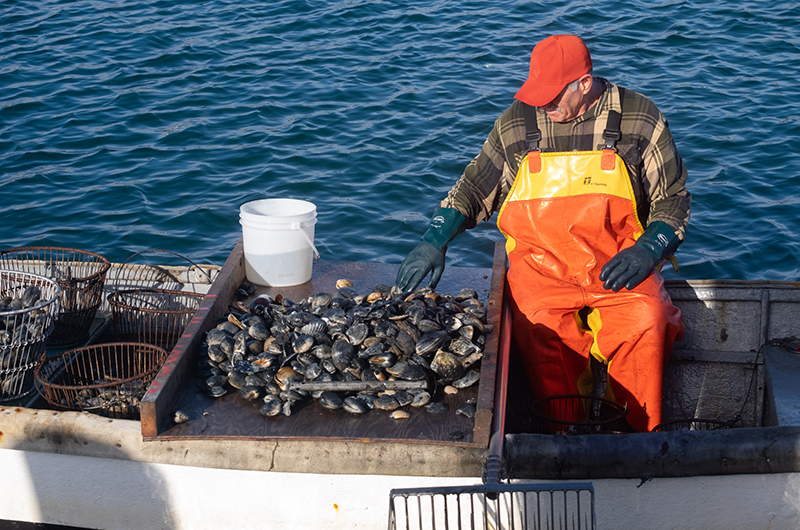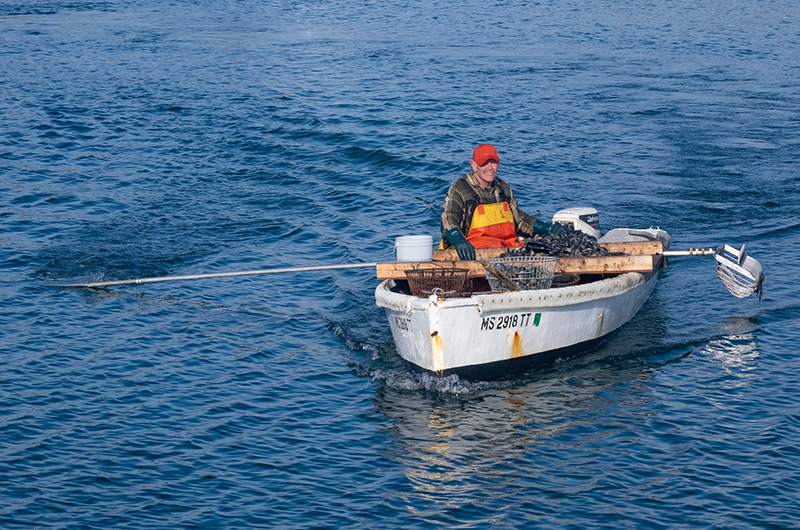The cold Vineyard winter has turned suddenly warm and a thick blanket of fog envelopes the Oak Bluffs harbor. A few yards off the bulkhead that in summer is choked with tourists quaffing umbrella drinks, a solitary figure stands in a small wooden boat, balancing with a naturalness borne of a lifetime on the water.
Billy Alwardt grips a 26-foot bull rake, a long aluminum pole with a tined basket at the bottom. A small outboard motor rattles. His pace is deliberate. He rocks forward, digs into the muck on the bottom of the harbor, and drags the rake a few inches forward. He does it again and again, before hauling the pole up off the bottom and shaking the final dregs of muck out of the rake. He levers the rake aboard and dumps a pile of hardshell clams on his culling board to be sorted. It is back-breaking work. He claims to be semi-retired, but he appears to be toiling harder than most fully employed workers.
There is no one else around. Others are unable or unwilling to fish this hard. Mr. Alwardt is his own boss today and every day. That’s the way he likes it.
“I don’t have to depend on it,” says the 64-year-old fisherman. “I do it because I like it. It’s a tough way to make a living. It’s hard work. I like it because it is peaceful. I got the place to myself.”
These are effusive words from Mr. Alwardt, who has a gruff side. He bemoans overcrowding and overdevelopment on Martha’s Vineyard because they threaten the shellfish stock and his livelihood. He recalls days when dragging one small stretch of the harbor would yield eight bushels of littlenecks. If not for a lousy year of bay scallop fishing, he might still be scalloping this month. Long after most have given up trying to drag a living out of the water, he is here in the harbor, hunting littlenecks, cherrystones and chowder clams.
He says there’s an art to coaxing clams off the bottom. By the look of his quickly-filling wire baskets, he seems to have mastered it.
“You pull the teeth through the bottom,” he says, gesturing toward the basket at the bottom of his bull rake. “That’s a small one. I used to pull 20-tooth rake. Now I’m in my 60s so I go smaller. I can tell when the rake hits the bottom. You gotta know how much handle to put out, different size teeth. When it’s colder, you use longer size teeth. Because they go down,” he says, referring to the quahaugs. “They’ll go down 10 inches. Right now they’re down because of the cold water. April they’ll come up. It will be good digging in April.”
It’s a lucky time in the land of supply and demand. The price of clams is up at the moment. Mr. Alwardt thinks it may be because all the rain and stormy weather off Island has cut into the supply. At the Boston-based wholesaler Red’s Best, which works with fish processors in New England ports, including Menemsha, Mr. Alwardt expects to fetch a wholesale price of 25 cents apiece for his littlenecks, the smallest and most delectable size he is harvesting. He’ll get 19 cents a piece for the next size, cherrystones, and 35 cents a pound for the largest chowder clams or quahaugs. It’s enough to make a little profit from a day’s hard work, but not many are willing to do it.
“It depends how many fishermen. If there was 10 fishermen, we’d all starve,” he says. Now he’s one of the last Islanders to make his living this way. “Years ago, there would be 10, 20 guys out here digging. There ain’t as many clams, and nobody wants to work. You can make a living at it, but you got to get up and dig every day.”
He starts every day at 7 a.m., except for the days when the temperature falls below 28 degrees and shellfishing is prohibited. Raking quahaugs doesn’t require a lot of equipment. His boat needs to be hauled and painted once a year. The Johnson outboard motor needs a little attention. A lifetime of fishing has taught him a minimal combination of the right kind of gear makes the job easier.
“That’s what’s good about this, there’s no expenses,” he says. “I can go six days on a tank of gas. It’s an ideal boat, it’s an old boat. Low sides, don’t catch much wind. A good boat to dig out of. Today was good, I got on them pretty quick this morning. If you can get out of here by 10 a.m., 11 a.m. you’re doing good.”
Billy Alwardt is doing good.
“Better then wearing out my recliner,” he says. “Days like this, what a better place to be.”






Comments (4)
Comments
Comment policy »